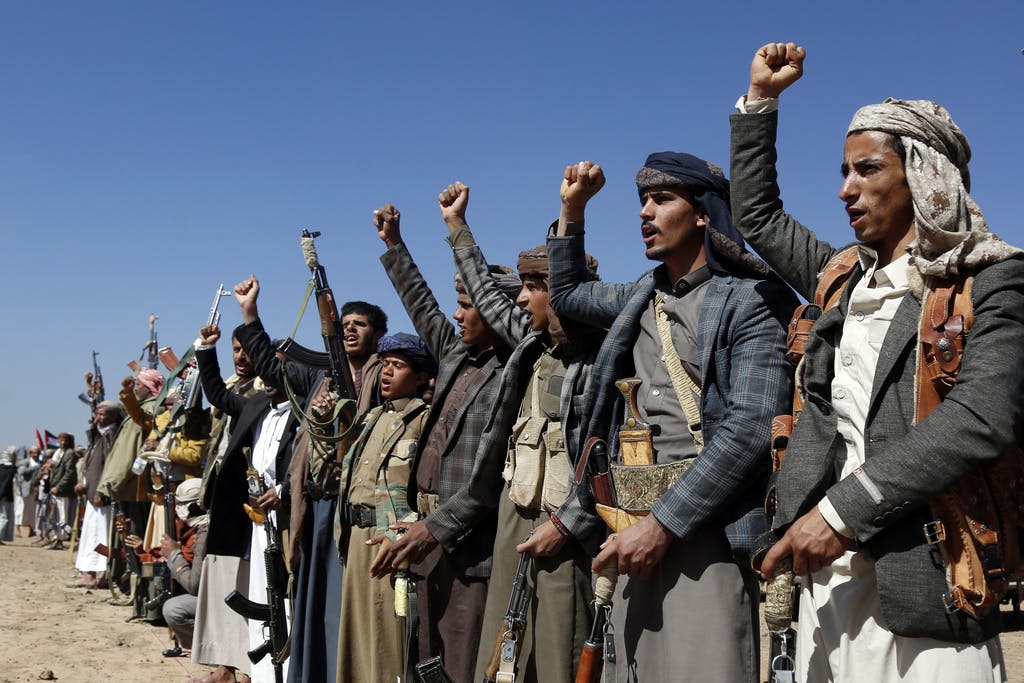Biden Deploys His Favorite Low-Impact Weapon Against the Houthis — Sanctions
The administration apparently thinks that legal measures will deter Houthi rebels from aiming more missiles at ships in the Red Sea.

The imposition by the Biden administration on Thursday of sanctions on four leaders of Yemen’s Houthi rebel group who have supported the terrorists’ recent attacks on vessels in the Red Sea and Gulf of Aden will be seen as a weak response.
The Houthi henchmen — Mohamed al-Atifi, Muhammad Fadl Abd al-Nabi, Muhammad Ali al-Qadiri, and Muhammad Ahmad al-Talibi — are all accused of assisting or sponsoring acts of terrorism, according to the United States Treasury.
The sanctioning of the individuals means that access to American property and bank accounts will be blocked and the targeted persons and companies will be prevented from doing business with Americans. The larger question is whether the sanctions will do anything to stop Houthi attacks on ships in the Red Sea.
Those attacks have multiplied since November over Israel’s war on Hamas. The Houthis, who are backed by Iran, say they are targeting vessels out of solidarity for Palestinian Arabs in Gaza. Most of the ships they have attacked are vessels with tenuous or no clear links to Israel. The United States Central Command has, in concert with the British military, recently stepped up attacks against Houthi missile launch sites in Yemen.
Members of a former rebel group originally from the remote mountains of northwest Yemen, Houthi leaders are generally seen as having few assets within reach of American authorities to be affected by the sanctions. Why even bother, then? Middle East analysts say the sanctions may have an impact simply by reminding movement leaders that America knows who they are, and may be tracking them.
A state department official, Matthew Miller, said in a statement that the U.S. “is continuing to take action to hold the Houthis accountable for their illegal and reckless attacks on vessels in the Red Sea and Gulf of Aden.”
Yet on Thursday, a Yemeni politician who serves as the leader of the Houthi movement, Abdel Malek al-Houthi, said in a speech: “Since the beginning of the offense, with aid raids on our country, and missiles strikes from the sea, the Americans were not able to stop our strikes in the sea and our targeting of ships. But they got themselves, as well as the British, in this problem.”
Mr. Miller added that “the Houthis’ terrorist attacks on merchant vessels and their civilian crews in the Red Sea and the Gulf of Aden have disrupted international supply chains and infringed on navigational rights and freedoms.”
That is an understatement.
According to the United Nations Conference on Trade and Development, freight transiting the Suez Canal has dropped by 45 percent in the two months since attacks by Yemen’s Houthis led shipping groups to divert freight, disrupting already strained maritime trading routes. The agency stated this week that 39 percent fewer ships than at the start of December transited the canal, leading to a 45 percent decline in freight tonnage.
A Treasury under secretary, Brian E. Nelson, said Thursday’s joint action with Britain “demonstrates our collective action to leverage all authorities to stop these attacks.”
Yet they are not stopping.
As recently as Wednesday, two American-flagged ships carrying cargo for the U.S. defense and state departments came under attack by Houthi rebels, American officials said, with the U.S. Navy intercepting some of the incoming fire. Washington and London launched multiple rounds of airstrikes seeking to stop the attacks, but the Houthis are still undeterred.
That means, essentially, that Tehran is not deterred. The imposition of sanctions by the White House as a lever to stop aggression will raise the same questions as did the sanctioning of Russian banks and business early on in Moscow’s invasion of Ukraine. While there is little doubt that sanctions hurt Russian industry, they have also done little, if anything, to stop or impede Russia’s ongoing war.
The crisis in the Red Sea is different, of course, and involves a different set of rogue actors. But President Biden’s reflexive resorting to the sanctions toolkit to fix all manner of geopolitical problems will be called into question as long as Houthi attacks continue.
